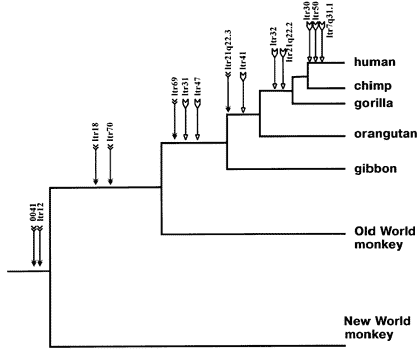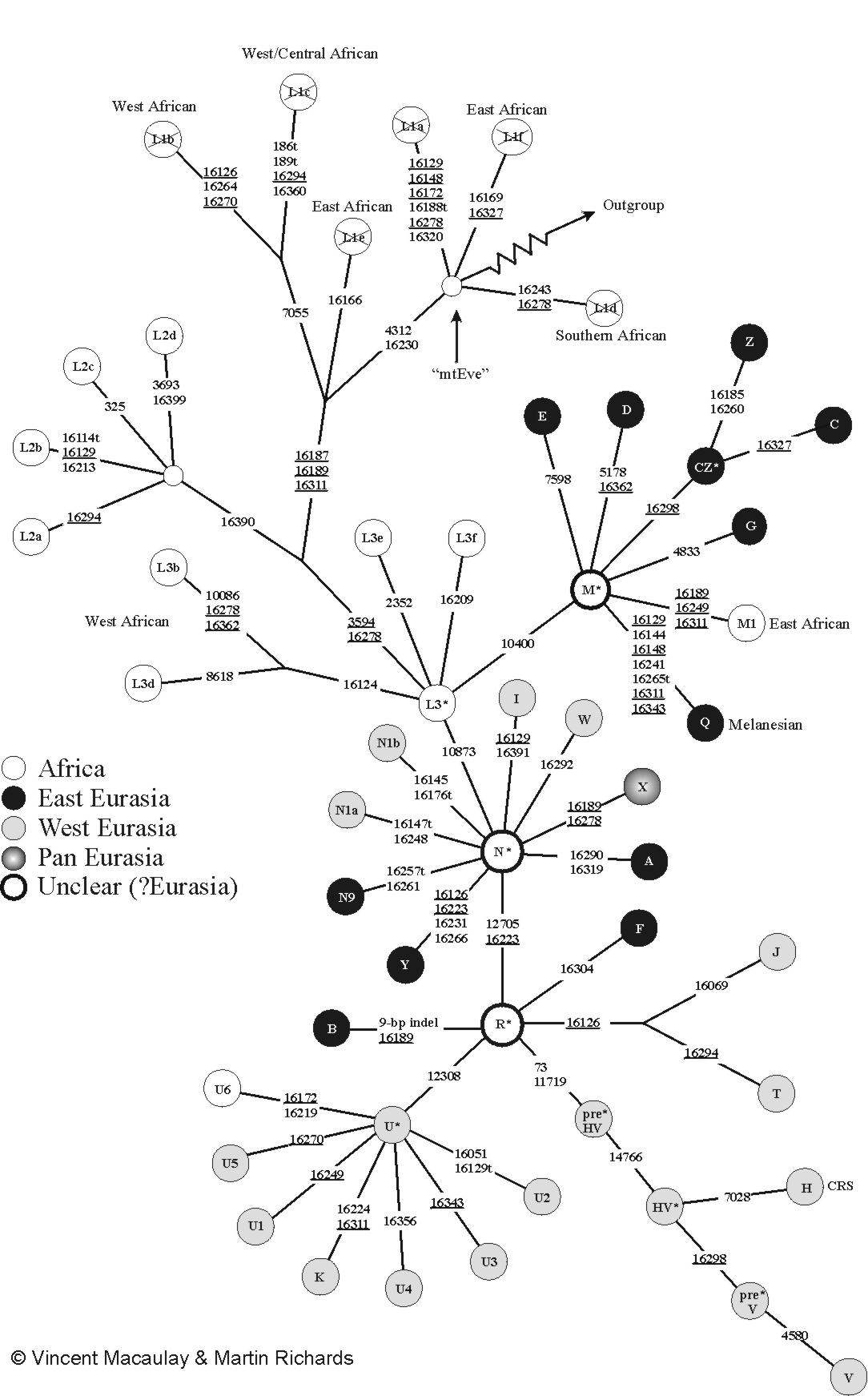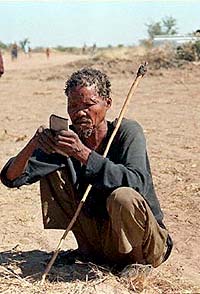We do. Here, for example.

There are a lot more "pieces" of DNA which can be traced than just the mitochondrial or Y-chromosome DNA, and each one gives different views into the big picture.
Posted on 02/02/2004 12:31:53 AM PST by chance33_98
Age of Our Ancestors
How Our Genetic Adam Is Much Younger than Genetic Eve
Commentary By John Allen Paulos
Feb. 1 — A new book, The Journey of Man, demonstrates how recent advances in genetics, particularly those involving the Y-chromosome, allow us to follow the arc of human migration out of Africa, our ancestral home.
Although Neanderthals and other hominids related to Homo sapiens date back hundreds of thousands of years, the book's author, geneticist Spencer Wells, shows that our origins are much more recent. Presenting the work of Luigi Luca Cavalli-Sforza, Richard Lewontin, and other eminent researchers, Wells argues convincingly that all men on earth (the Y-chromosome is passed only from father to son) can trace their roots to a particular male who lived in Africa, almost 60,000 years ago.
Likewise, all humans on earth can trace their lineage through our maternally inherited mitochondrial DNA back to a particular woman, who lived in Africa roughly 150,000 years ago. This "Adam" is my great-grandfather roughly 2500 times removed and this "Eve" my great grandmother roughly 6500 times removed. (Yours too, so we're all distant cousins.)
In coming to these conclusions, Wells relies upon a variety of mathematical techniques, ranging from statistical tests to measure the similarities between and among the genomes of present-day populations to carbon dating and other methods commonly employed at archeological sites.
The probability of branching processes lends additional support as does empirical research on the world's various ethnic groups. Most revealing is the use of the rate at which random mutations naturally occur to infer the paths of our ancestors around the globe.
Family Recipes as a Metaphor
Wells employs a culinary metaphor to clarify the notion of a genetic Eve, whose existence was long disputed by those who believed that mankind developed independently in several locations around the world. Altering Wells' metaphor a little, let's imagine a small village that has been inhabited for millennia. Imagine further that we go way back in time and note that the few families in the village use different recipes for their primary meal, and that the recipes are handed down from mother to daughter only.
Very complex, the recipes can be modified in hundreds of ways — a different ingredient here, longer cooking time there, etc. — and every once in a while a daughter makes a tiny change in her mother's recipe, which she then passes down to her daughter(s). Sometimes because of accident, disease, or simply a line's not having any daughters, a family's recipe and its variants die out. In fact, let's assume that all but one of the original recipes and their variants disappear. Thus in the village we can now find only one of the dozen original recipes, dating back X thousand years, and its many variants.
If for the village we substitute Africa, and for recipes we substitute the human genome, the surviving original recipe is analogous to the genetic makeup of African Eve since all the surviving recipes derive from it just as we all can trace all our mitochondrial DNA back to a particular woman who lived 150,000 years ago.
And just as our mitochondrial DNA is inherited only through our mothers, the male Y-chromosome is passed only from fathers to sons. So let's invent another just-so story about, say, elaborate hunting rituals that are passed down from father to son with very rare changes. We again go back to a time when there were very few families and hence few different hunting rituals.
Once again, each of these elaborate hunting rituals changes very slowly. Furthermore, because of famine, disease, or not having any sons, a family's hunting ritual and its variants die out. Let's assume that all but one of the original rituals and their variants disappear. Thus in the village we can find only one of the few original rituals, dating back Y thousand years, and its many variants, and thus conclude that all existing rituals derive from the original one, the analogue of a genetic Adam.
The Paths We Took
Note that X and Y need not be equal since recipes and hunting rituals will no doubt change and die out at different rates, so our genetic Eve did not meet our genetic Adam (and both, of course, had parents, grandparents, and other progenitors).
There is, however, much more in Journey than this absence of a prehistoric romance. As mentioned, the bulk of the book examines how geneticists study small changes in the DNA of our Y-chromosomes and use the rate at which they naturally occur as a sort of molecular clock to determine when and where various groups and clans of our prehistoric ancestors split off and spread over the earth (along the coast of India to Australia, later into Eurasia, and then down to the Americas across the Bering Sea).
If we know where we originated, and if a distinct recipe or ritual and its descendants, to revert to our metaphor, appears only in a neighboring village, then this (along with much other evidence) indicates that these people left the original village at a certain time. And if their descendants' recipes and rituals appear only in an even more distant village, then these others left still later.
The common childhood game in which we change, a letter at a time, one sequence of letters into another — say GENE to GONE to GORE to MORE to MARE to MARS — also sheds some light on what geneticists do when analyzing the branching changes in the very long sequence of "letters" that constitute our DNA. If each of the changing sequences of letters also gave rise to other changing sequences of letters and if some of these sequences split off and moved to different physical locations, we would be led to the sort of considerations and methods that are described in The Journey of Man.
We've come a long way, and the fascinating, sometimes counterintuitive details of the trip are finally becoming a little clearer.
Darwin, speaking on pigeons, mused that all pigeons descended from a single, mated-pair.
We do. Here, for example.

There are a lot more "pieces" of DNA which can be traced than just the mitochondrial or Y-chromosome DNA, and each one gives different views into the big picture.
So several specimens sprang at once?
Oh no ... incest!!
The head of John the Baptist is being held captive in a mosque in Damascus. Good excuse for us to invade Syria.
How long have there been human beings, homo sapiens sapiens?
No, he didn't.
Great as the differences are between the breeds of pigeons, I am fully convinced that the common opinion of naturalists is correct, namely, that all have descended from the rock-pigeon (Columba livia), including under this term several geographical races or sub-species, which differ from each other in the most trifling respects.The confusion may have arisen from this passage:[...]
from these several reasons, taken together, I can feel no doubt that all our domestic breeds have descended from the Columba livia with its geographical sub-species.
[...]
Fourthly, pigeons have been watched, and tended with the utmost care, and loved by many people. They have been domesticated for thousands of years in several quarters of the world; the earliest known record of pigeons is in the fifth Ægyptian dynasty, about 3000 B.C., as was pointed out to me by Professor Lepsius; but Mr. Birch informs me that pigeons are given in a bill of fare in the previous dynasty.
-- Charles Darwin, "On the Origin of Species", 1859
I have discussed the probable origin of domestic pigeons at some, yet quite insufficient, length; because when I first kept pigeons and watched the several kinds, knowing well how true they bred, I felt fully as much difficulty in believing that they could ever have descended from a common parent, as any naturalist could in coming to a similar conclusion in regard to the many species of finches, or other large groups of birds, in nature.However, in the context of the rest of the discussion surrounding this passage, it's entirely clear that he's talking about a common parent *species*, not a common parent individual, since the chapter concerns itself with whether different breeds of domesticated animals (e.g., all domesticated pigeon breeds) were derived from different wild species, or the same wild species.
"ME"?
In any case, the answer to the question depends on how precisely one chooses to define "first person". It's not as simple a term as it first seems.


No. Mitochondrial DNA comes only from your mother. Cellular DNA comes half from your mother, half from your father.

"#$%$#@!! This what I get for buying a PDA running an OS from Microsoft! Maybe those homo sapiens sapiens guys will let me borrow a PalmPilot."
Disclaimer: Opinions posted on Free Republic are those of the individual posters and do not necessarily represent the opinion of Free Republic or its management. All materials posted herein are protected by copyright law and the exemption for fair use of copyrighted works.